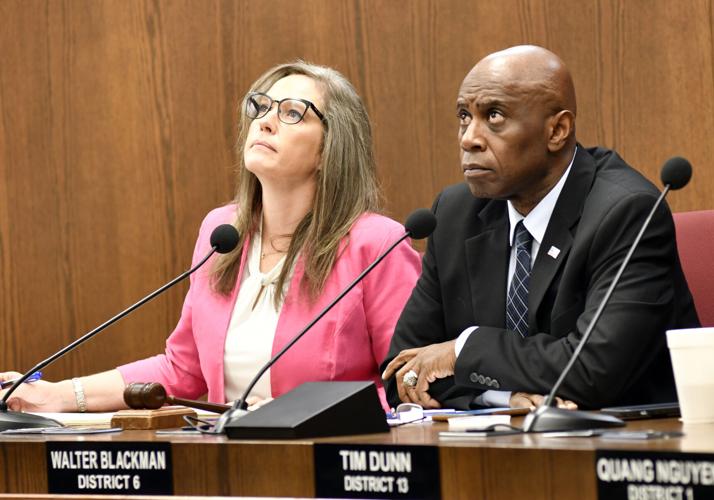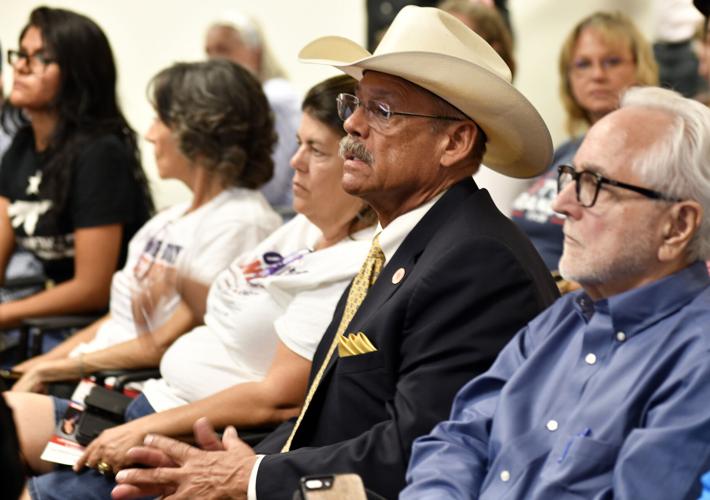PHOENIX — One of the leading proponents of the claim of fraud in Arizona elections wants “vigilantes” to monitor ballot drop boxes in the upcoming election.
During an informal legislative hearing Tuesday, Sen. Kelly Townsend, R-Apache Junction, complained about the failure of the Senate to either outlaw drop boxes entirely or require that they be monitored 24 hours a day.
In fact, Townsend wants to deal with the issue of possible fraudulent ballots by eliminating early voting entirely.
But that measure has failed to advance amid concerns about its effects, like one expressed by Senate President Karen Fann, R-Phoenix, about telling the 90% of Arizonans who now vote early, including the elderly, that they instead may have to stand in line in the sun to vote in the August primary.
And Townsend said Tuesday that even if she could line up the votes this legislative session to outlaw drop boxes, or at least require they be monitored, it already is too late to put that into effect for the Aug. 2 primary.
“That’s unacceptable,” said Sen. Kelly Townsend, R-Apache Junction, who also was on the Tuesday panel. But she had a solution of sorts that involved the people watching the hearing.
“I have been so pleased to hear of all you vigilantes out there that want to camp out at these drop boxes, right?” she said to applause from the audience. “So, do it.”
‘People out there watching you’
Townsend said that will send a message to “mules” who carry around and deposit fraudulent ballots into those boxes.
Among the options, she said, will be “trail cameras,” normally used to monitor wildlife in remote locations. But that’s only part of it.
“We’re going to have people out there watching you,” Townsend said. “And they’re going to follow you to your car and get your license plate.’’
Townsend, in an interview with Capitol Media Services after the hearing, defended the call.
“If it’s a person committing a crime, why wouldn’t you get their license plate?’’ she asked. Nor does she consider it intimidation.
She acknowledged that state law allows individuals to deposit not only their own ballots in drop boxes but also those of people who live in the same household. And caretakers also can handle multiple ballots.
“I don’t support intimidating people that are sticking grandma’s ballot in a box,” Townsend said. “But if there’s a clear crime, I want there to be a deterrent.”
That, then, leaves it up to the person doing the observation to determine whether a crime is taking place.
Townsend said that becomes obvious in certain cases, saying there have been situations where individuals drive up to a drop box with a box or backpack full of ballots. She said it’s unlikely that anyone has 30 people living in their home.
Movie claims vote fraud
Townsend’s comments came at the end of a presentation to a select group of lawmakers by organizers of True the Vote. That’s the organization that provided material to Trump supporter Dinesh D’Sousa for his “2000 Mules” movie claiming massive vote fraud from people depositing multiple early ballots in drop boxes, including here in Arizona despite state laws to the contrary. The Associated Press has labeled the analysis “flawed.”
Much of what was presented Tuesday was not new but instead came from the movie. That included some video, none of which apparently came from Arizona, of people stuffing ballots into drop boxes.
But there is an Arizona angle to all this.
Guillermina Fuentes, a member of the Gadsden Elementary School District, was indicted last year on ballot abuse, forgery and conspiracy charges. She is set to enter into a plea deal Thursday.
But the allegations presented by True the Vote contend that the problems with early voting and drop boxes are common.
They said cell phone geolocation data shows the same people — they don’t have names but only electronic identification data — going to drop boxes over and over again. Catherine Engelbrecht, the organization’s founder, said that could happen only because these drop boxes are not monitored.
And Gregg Phillips, also with True the Vote, brushed aside questions about whether such geolocation data is sufficiently accurate to reach the conclusions his organization reached.
Panelists hand-picked
Support for restricting or eliminating ballot drop boxes appeared to be unanimous among the members of the panel. That, however, was hardly a cross-section of legislative sentiments as only those chosen by Rep. Shawnna Bolick, R-Phoenix, were allowed to serve and ask questions of the presenters.
Bolick said Democrats were left out because they have shown no interest in supporting any of the measures Republicans have proposed this year to revamp election procedures. She said, though, they were welcome to sit in the audience.
But the panel she chose also did not include Rep. Mark Finchem, R-Oro Valley, who has been pursuing questions of election irregularities since the 2020 election.
Finchem told Capitol Media Services he is glad that Bolick is finally taking the issue seriously. He said she had shown no interest in the November 2020 hearing he organized at a downtown Phoenix hotel where Trump supporters, including Rudy Giuliani, presented what they said was their own evidence of misconduct.
Bolick said that’s not true, saying she didn’t go to that hearing because it was her daughter’s birthday.
And there’s something else: Finchem and Bolick are both running to be the Republican nominee for secretary of state. But she denied that Tuesday’s event was in any way designed to provide some momentum to her campaign ahead of the Aug. 2 primary.
“I would never question the motives of one of my colleagues,” Finchem responded with a smile.
Arrests needed for change
There have been no independent polls in the race. But the most recent campaign finance reports showed Finchem has collected more cash than anyone else at $940,000.
Businessman Beau Lane took in $862,000, followed by Bolick at $213,000 and Sen. Michelle Ugenti-Rita at $123,000.
Rep. Quang Nguyen, R-Prescott Valley, a member of the panel, said he has seen enough and reached some conclusions.
“The only thing I could see coming out of this meeting is people going to jail,” he said. “Until people go to jail, things may not change.”
Townsend added to that, urging the crowd to chant, “What do we want? Indictments. When do we want them? Now.”
Bolick said that information gathered from True the Vote will be turned over to Republican Attorney General Mark Brnovich who has said he is looking into election irregularities.
But Brnovich may have to wait.
Information sent to FBI
Phillips, a board member of True the Vote, told lawmakers information already has been turned over to the FBI. He said it is up to the federal agency what it wants to share with the attorney general.
On Tuesday, Bolick repeated her allegation that the 2020 election was “rigged.”
She does have some history on this front.
In 2021, Bolick sponsored legislation to allow the Arizona Legislature to overturn the results of a presidential election, even after the count is formally certified by the governor and secretary of state — and even after Congress counts the state’s electors.
The measure had a series of provisions designed to make it easier for those unhappy with elections to go to court.
But the most sweeping would say that, regardless of any other law, the Legislature retains ultimate authority in deciding who are the state’s presidential electors. And it would spell out that lawmakers, by a simple majority, could revoke the formal certification of the election results and substitute their own decision at any time right up to the day a new president is sworn in.
Bolick said Tuesday, though, that was only a preliminary approach, noting she never advanced the measure.





